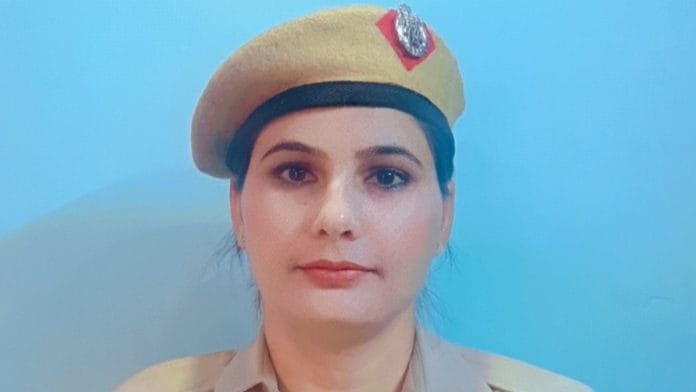New Delhi: Seema Dhaka, a head constable with the Delhi Police, remembered every bit of a rescue mission in September that involved reuniting a small boy with his mother in Delhi.
“It was one of the most difficult ones. The child, who was from Delhi, went missing in West Bengal where he was living with his father. A complaint was registered in Delhi by his mother,” Dhaka, who is posted with the Samaypur Badli police station, told ThePrint.
“There were about 150 villages under each police station in Bengal and we had to trace each one of them. But we finally managed to find the child in a remote village in Bengal that we reached after crossing two rivers, amid heavy rains.”
Between August and October, Dhaka had rescued 76 children from Delhi-NCR, West Bengal, Uttar Pradesh and Punjab. Of these, 56 are below the age of 14. She has now become the first police personnel to be awarded with an ‘out-of-turn’ promotion for her achievement.
Delhi Police Commissioner S.N. Shrivastava Wednesday took to Twitter to congratulate Dhaka for her “fighting spirit”.
Women HC Seema Dhaka, PS Samaypur Badli, deserves congratulations for being the first police person to be promoted out of turn for recovering 56 children in 3 months under incentive scheme. Hats off to fighting spirit and joy brought to families. @LtGovDelhi @HMOIndia @PMOIndia
— CP Delhi #DilKiPolice (@CPDelhi) November 18, 2020
Shrivastava had in August launched the ‘Incentive Scheme‘ — an ‘out of turn’ promotion for constables who find at least 50 missing children, below the age of 14, in a year.
But promotion was one of the last things on Dhaka’s mind. “For me, the happiness on the faces of parents after finding their lost children was priceless. Some of the FIRs were as old as six-seven years. But I am grateful to commissioner sir (Shrivastava) for acknowledging my efforts,” she said.
Dhaka, 33, is originally from Baraut in Uttar Pradesh. She had joined the Delhi Police as a constable in 2006 and was promoted as head constable in 2014. She will now be an assistant sub-inspector.
Recalling her rescue operations, Dhaka also pointed out how tracing people who had registered various missing complaints was one of the hardest parts.
“Tracing complainants who had registered these FIRs was difficult. A few of them were filed as far back as 2013. Some complainants had changed addresses. And in some cases, we had to physically verify the addresses to proceed further,” she said.
Also read: 98% of Delhi’s rape victims were relatives or acquaintances of accused, say police
Surviving Covid-19
A significant number of the children rescued by Dhaka were those who had left their homes after getting addicted to drugs. Many of them were traced to areas in Delhi-NCR.
“I remember two such kids, who were still drugged when they were found. After a medical examination, we sent them to the Children Welfare Committee and they were then sent to rehabilitation centres,” Dhaka said.
Some also included minor girls, aged barely 11 and 12 years, who had run away from home. “After two or three years, they realised their mistake and wanted to go back to their parents. They had tried to get in touch with their families over phone. We found out the call details in those cases and traced the girls.”
Then there were cases where children were abducted due to personal animosity. In many of these cases, the accused were also arrested under Section 376 of the Protection of Children from Sexual Offences Act.
“There was one case in my area, in Samaypur Badli, in June. A married woman, who had fallen in love with her co-worker, was being forced by him to meet during the lockdown. The woman refused and the man then kidnapped her three-year-old child. We traced the man with the kid within two and a half hours and arrested him,” Dhaka said.
Dhaka had even tested positive for Covid-19. She recovered in July and began her rescue operations in August. “I didn’t fear contracting Covid-19 again because I had already been infected once. But due to unavailability of trains and restriction in movement, we had to stay at various places when we went to rescue children. That posed challenges for us,” she said.
A total of 1,440 kids have been traced by the Delhi Police since early August after the Incentive Scheme was announced. In comparison, 3,336 missing children were traced in all of 2019 by the Delhi Police.
Also read: After 49 days in UP jail, Kerala journalist finally gets to talk to lawyer for 5 mins on phone






